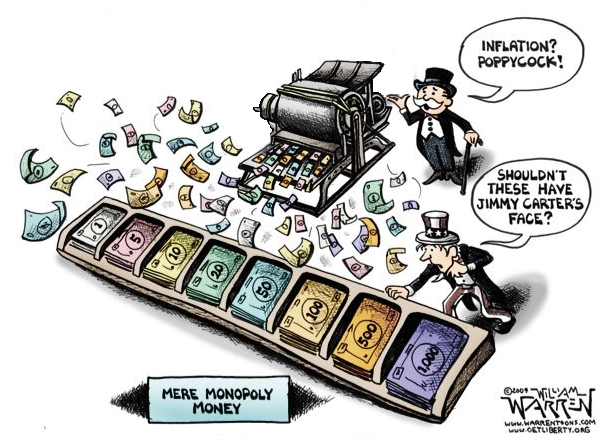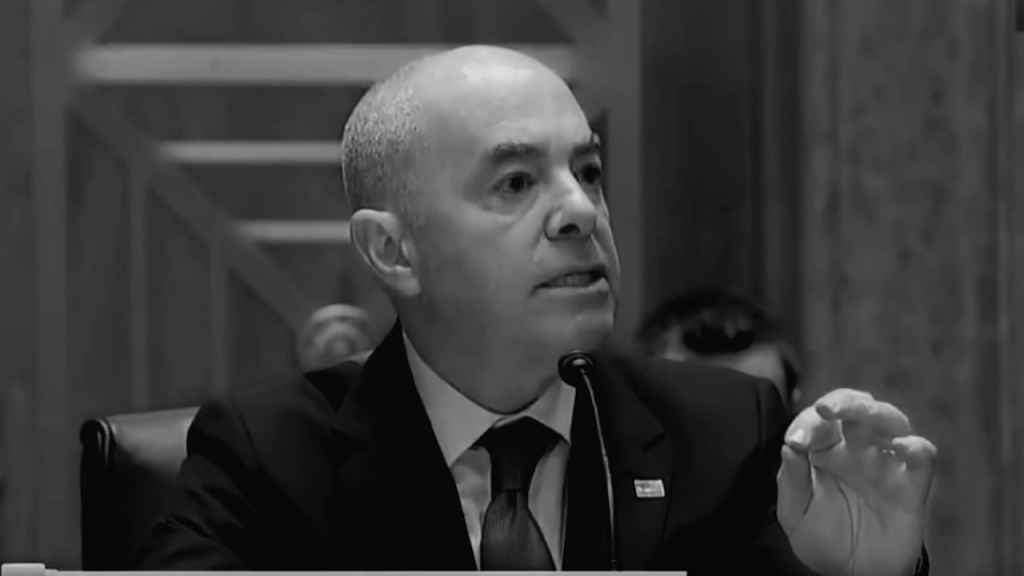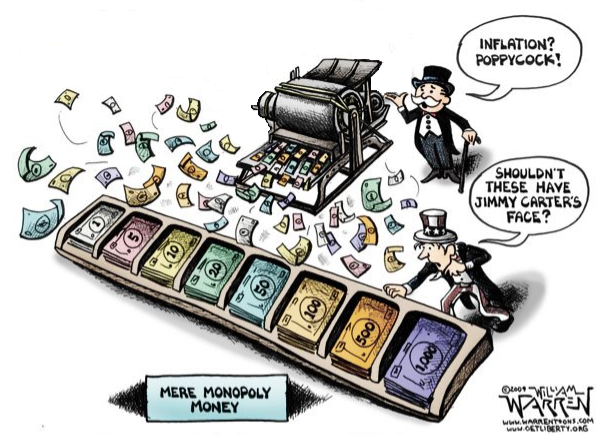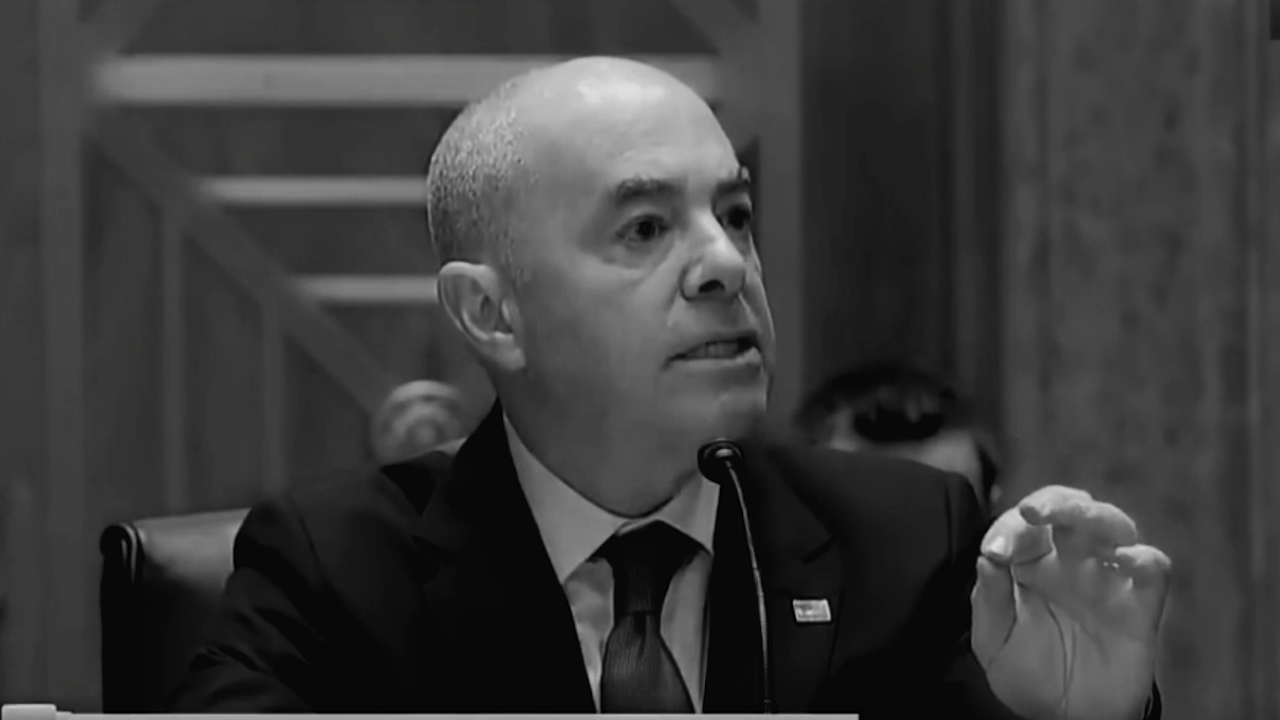May 12, 2022
Permission to republish original opeds and cartoons granted.
Inflation up another 8.3 percent in April as Biden economy teeters on the edge. Has the recession already begun?

By Robert Romano
Consumer inflation increased another 8.3 percent annualized in April, according to the latest data compiled by the Bureau of Labor Statistics (BLS), amid increases in prices for housing, food, airline tickets and new vehicles.
And it is crushing wages, with BLS reporting a 2.6 percent drop in real average hourly earnings, thanks to the inflation.
Inflation has now been north of 5 percent since June 2021, in what is the worst inflation since the late 1970s and early 1980s. It caused recessions then, and it may have already induced another recession now just two years after the 2020 Covid recession.
The U.S. economy already contracted 1.4 percent on an inflation-adjusted basis, according to the Bureau of Economic Analysis. The economy did grow on a nominal basis by almost 6.5 percent annualized, by $382 billion to $24.4 trillion, but because inflation averaged about 8 percent the first quarter, real GDP came in negative.
The same thing could be happening right now. With April’s inflation number on the books, May and June will tell the tale of whether President Joe Biden will preside over a recession in 2022 — or perhaps in 2023 or 2024.
If inflation remains above, say, 7 percent throughout the second quarter, nominal growth appears unlikely to be that high. In just 18 economic quarters out of 127 quarters since 1989, nominal growth annualized was above 7 percent. That is only 14 percent of the time. Meaning, there’s about an 86 percent chance it will be less than 7 percent nominal growth in the second quarter.
But when one considers that there have already been massive nominal gains in GDP following the Covid lockdowns — including a monster 38 percent nominal gain in the third quarter of 2020, and a 14.5 percent nominal gain in the fourth quarter of 2021 — it is hard to imagine another big nominal GDP gain in the current environment with high inflation, the continued supply chain crisis and now the war in Ukraine.
It's like a flock of black swans flying in a triangle formation. What else could possibly go wrong?
Again, in the first quarter, growth was almost 6.5 percent, which was the lowest reading since 2019. So, the economy is already slowing down. Before that, one has to go back to the second quarter of 2018 to find annualized nominal growth above 7 percent, and the second quarter of 2014 before that. It has not been happening a lot in the past 20 years.
Meaning, the escape route to avoid a recession right now is rapidly narrowing. It is still possible, but politically, President Joe Biden and Congressional Democrats might be better off in the long run if the recession happens right now, which would certainly impact the Congressional midterms in November, but might be far enough away from 2024 to provide ample time for a robust economic recovery.
Ronald Reagan had a massive recession in 1982, but by 1984, the recovery was fully underway and he easily defeated Walter Mondale in a 49-state landslide.
On the other hand, given the ongoing supply chain crisis and no end in sight for Russia’s war in Ukraine, which is further exacerbating oil, natural gas and wheat global supply lines, it is foreseeable that even with a recession right now, inflation could remain elevated for the foreseeable future — which could have the economy overheating once again in 2023 headed in the 2024 presidential election cycle.
The point is that it is never a great time for an administration to have to weather a recession. The American people can be quite forgiving, but in Biden’s case, if the inflation remains a going concern after 2022, their patience may end up running thin.
Robert Romano is the Vice President of Americans for Limited Government Foundation.
To view online: https://dailytorch.com/2022/05/inflation-up-another-8-3-percent-in-april-as-biden-economy-teeters-on-the-edge-has-the-recession-already-begun/
Video: The Truth Police

To view online: https://youtu.be/1n2I0t9MAuQ

ALG Editor’s Note: In the following featured report from the Epoch Times’ Mark Tapscott, the National Institutes for Health have made $350 million in secret payments to Dr. Anthony Fauci and hundreds of other scientists for royalties that might expose conflicts of interests at the agency:
![]()
Mark Tapscott: Democrats Silent as Republicans Rip Into Secret Royalty Checks to Fauci, Hundreds of NIH Scientists
By Mark Tapscott
Top Democratic leaders with oversight of the National Institutes for Health (NIH) are keeping quiet about the $350 million in secret payments to agency leaders like Dr. Anthony Fauci and hundreds of its scientists.
The Epoch Times received no responses from multiple requests to Sen. Patty Murray (D-Wash.) and Rep. Frank Pallone (D-N.J.) for comment on a report by a non-profit government watchdog estimating that Fauci, former NIH director Francis Collins, and hundreds of NIH scientists got as much as $350 million in undisclosed royalty payments from pharmaceutical and other private firms between 2010 and 2020.
The revelations from Open the Books, which were first reported on May 9 by The Epoch Times, are based on thousands of pages of documents the group obtained from NIH in a Freedom of Information Act (FOIA) lawsuit in federal court. The suit was filed by Judicial Watch on behalf of Open the Books.
Open the Books is a Chicago-based nonprofit government watchdog that uses the federal and state freedom of information laws to obtain and then post on the internet trillions of dollars in spending at all levels of government.
Pallone is chairman of the House Committee on Energy and Commerce, while Murray is chairman of the Senate Committee on Health, Education, Labor and Pensions. Their panels are the main congressional oversight tools for NIH.
A spokesman for NIH also did not respond to multiple requests from The Epoch Times for comment.
Because NIH hands out $32 billion in research grants to medical institutions and researchers annually the undisclosed royalty payments, which are usually for work on a new drug, may indicate the presence of massive and widespread conflicts of interest or the appearance of such conflicts, both of which violate federal ethics laws and regulations.
Collins resigned as NIH director in December 2021 after 12 years of leading the world’s largest public health agency.
Fauci is the longtime head of NIH’s National Institute for Allergies and Infectious Diseases (NIAID), as well as chief medical adviser to President Joe Biden.
Lane is the deputy director of NIAID, under Fauci.
Fauci received 23 royalty payments during the period, while Collins was paid 14. Clifford Lane, Fauci’s deputy, got eight payments, according to Open the Books.
While Pallone and Murray were silent on the secret NIH payments, Republicans expressed outrage at what they see as serious conflicts of interest.
Sen. Marsha Blackburn (R-Tenn.) told The Epoch Times, “the NIH is a dark money pit. They covered up grants for gain of function research in Wuhan, so it is no surprise that they are now refusing to release critical data regarding allegations of millions in royalty fees paid to in-house scientists like Fauci.
“If the NIH wants to keep spending taxpayer dollars, they have a responsibility to provide transparency.”
Sen. Ted Cruz (R-Texas) said, “This report is disturbing and if it is true that some of our country’s top scientists have conflict of interest problems, the American people deserve to have all the answers.”
Rick Manning, president of Americans for Limited Government, also pointed to the potential seriousness of the apparent conflicts of interest, and the need for a congressional probe.
“The obvious conflict of interest for the public health scientist recipients of the hundreds of millions of dollars in royalty payments calls into question who they have been working for,” Manning asked.
“Congress must demand a full, non-redacted accounting of these payments along with the projects these public employees have been involved in and stakeholder interests in those projects.
“At a time when the truthfulness of public officials like Dr. Fauci, have come under intense scrutiny, it is critical for these relationships to be fully disclosed,” he said.
In a related development earlier this week, Rep. Brett Guthrie told a meeting of an energy and commerce subcommittee examining Biden’s 2023 budget proposal for HHS that the department that includes NIH needs much more congressional oversight.
“Oversight is especially important given the huge increases in funding requested by the Biden administration. The HHS budget before us today calls for a 12 percent increase in discretionary spending at HHS for Fiscal Year 2023,” Guthrie told the subcommittee.
“The budget specifically gives more than a $6 billion combined boost in funding to the Centers for Disease Control and Prevention (CDC) and the National Institutes of Health, both of which have come under fire recently over controversial masking guidance and COVID-19 research funded by NIH using American taxpayer dollars,” Guthrie continued.
“We need to hold NIH accountable and ensure taxpayer dollars are not going to labs engaging in risky gain-of-function research and ensure researchers are transparent about how they are spending taxpayer funded research grants,” the Kentucky Republican said.
To view online: https://www.theepochtimes.com/dems-silent-as-republicans-rip-into-secret-royalty-checks-to-fauci-hundreds-of-nih-scientists_4459722.html




